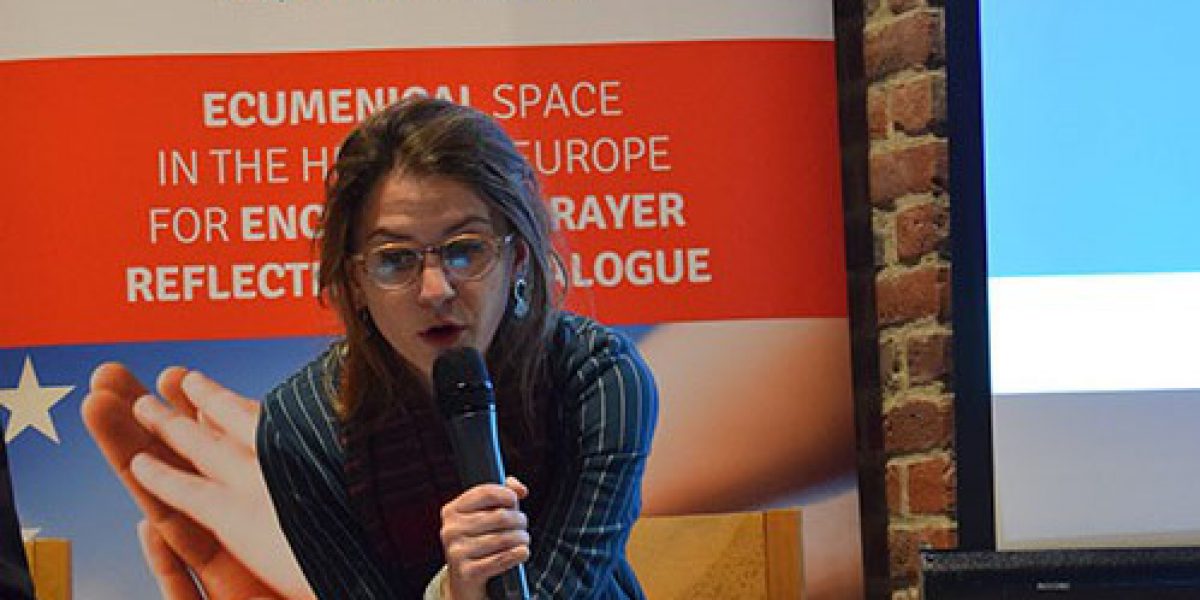Access to protection in Europe: A never-ending story
07 May 2019

Brussels, 7 May 2019 – Against the background of the upcoming European elections, JRS Europe, in a full room at Chapel for Europe, was excited to meet with committed migration and asylum experts and an enthusiastic audience to reflect on the challenges that refugees and migrants still face not only en route, but also even after they arrive in Europe.
Our speakers, Fr. Chika Onyejiuwa, Executive Secretary at Africa Europe Faith and Justice Network, Flor Didden, Migration Policy Officer from 11.11.11 and Jie Zhang, intercultural mediator at Foyer, together with our Advocacy Officer, Evita Armouti, presented the reality on the ground, raised concerns and made recommendations about the barriers that prevent people in need from fully exercising their right to seek asylum, and finally becoming an integral part of our societies.
Four years after the so-called migration crisis and despite the drop in the arrivals to Europe already since 2017, challenges with access to protection in Europe as such, still persist. This comes even though “the largest movements of populations take place often within the same country as so-called IDPs (Internally Displaced Persons), or in other cases between neighboring countries as cross-border refugees. The main reasons for people leaving their homes are violent conflicts,” Fr. Chika Onyejiuwa reiterates.
The EU and its Member States have the obligation to guarantee the right to seek asylum. However, to ask for it, one first needs to reach the territory of the EU. This might seem obvious but in practice there is hardly any legal way for people to do it. Given that the EU and its Member states systematically try to shift their protection responsibilities towards third countries, such as Turkey or Libya, by concluding agreements that prevent people even from departing, the situation exacerbates.
According to Flor Didden, effective access to safe and legal pathways has so far failed. The number of persons admitted through community or private sponsorship schemes and the so-called ‘’humanitarian corridors’’ endorsed on an ad-hoc basis by a limited number of governments, remains low in relation to the need.
On the other hand, the EU lacks a clear framework on humanitarian visas. Such visas, which usually come with a high amount of fees, are issued only upon Member States’ discretion having thus a low success rate. On the contrary, the current visa regime is designed for tourists, professionals, and students or for people that want to visit their family in Europe but only for a short period.
The figures on resettlement appear equally discomforting, according to Flor. In 2016, a less than 1% has been resettled and in 2017 this number did not even reach the 1%, whilst 10% of refugees worldwide are the most vulnerable and in acute need of resettlement.
Even if they manage to step foot on European soil, it does not mean that refugees will live happily ever after. Once in the territory of the EU Member States, barriers to effective protection can take the form of layers of additional procedures before the actual launch of their asylum claim (EU hotspot approach), fewer procedural guarantees, cumbersome and lengthy asylum procedures but also poor living conditions. As a result, the European and international rules on protection that Member States can often become a dead letter.
Currently, several Member States are competing in a race to the bottom when it comes to restricting rights for asylum seekers and refugees. This trend echoes a general EU approach focusing more on how to make migration management more efficient and step up the return of rejected asylum seekers rather than on shaping a more dignified, humane, and protective asylum system.
JRS Europe has been advocating on how to best achieve this fundamental shift in EU policies, especially by overhauling the Dublin system so that people’s preferences and protection needs are considered first. This is not simply an act of good will. It is in line with the EU values and principles as these are enshrined in the founding Treaties, such as dignity, respect of human rights and the rule of law.
EU is thus committed to guarantee these values not only vis-à-vis its citizens but also towards forced migrants, asylum seekers and refugees. As Jie Zhang pointed out, we must design asylum policies that have human beings in their core – instead of objects or numbers.
JRS Europe is campaigning for a Europe of protection, liberty, dignity and equality and solidarity: www.thepowerofvote.eu
